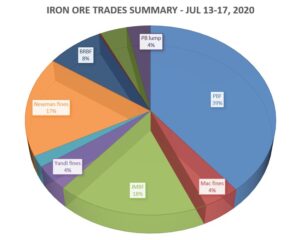A total of 2.104 million mt of iron ore was exchanged hands for the week ended Jul 17, with Australian fines dominating the market with little presence of Brazilian ores.
Australian Pilbara Blend Fines (PBF) garnered almost 40% or 39.11% of iron ore products share, while Jimblebar fines came in second with 18%, followed by Newman fines at 17%.
Brazilian ores seemed to miss out most of the transaction activities for the week with Brazilian Blend fines accounted only at 8% of the total trades, while high grade Carajas fines were virtually absence for the trading week.
Another interesting transaction during the week belonged to a trade of 40,000 mt of Mexican pellets being changed hand, despite the ample supply of Indian pellets especially among the ports.
Substituting Brazilian fines with concentrates
The low uptake for Brazilian fines were due to high prices, which caused many end-users to lower their usage and instead utilizing cheaper low alumina alternatives.
One of the alternatives such as iron ore concentrates became popular choices among mills which was widely available in the market and lower costs compared to Brazilian imports.
There was also concerns about the possible disruptions to Brazilian supply due to rising coronavirus cases in Brazil and scheduled port maintenance in July.
Lower Australian imports over near term
Besides the scheduled Brazilian port maintenance, Australian ports and terminals typically undergo for maintenance period after miners’ fiscal year ended on June 30.
Thus, some miners will lift much iron ore shipment in June to close account book on good notes before the end of the fiscal year in June.
Rio Tinto is one such example as the miner shipped 86.7 million tonnes of iron ore from Western Australia in the three months to June 30, higher than 85.4 million mt last year.
Though the slight increase in shipment, but it was done during the height of the coronavirus pandemic, which called for strict lockdown measures in Australia during the quarter.

